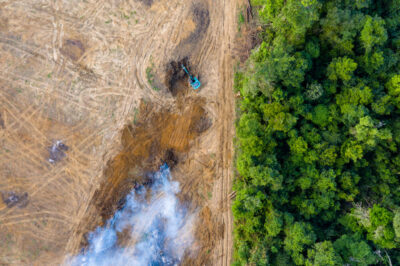Main content
At the symposium entitled Climate changemakers in health: from science to action organised by the Dutch Society of International Health and Tropical Medicine (NVTG) on November 11, 2021, I was privileged to listen to Dr Renzo Guinto, Chief Planetary Health Scientist of the Sunway Centre for Planetary Health in Malaysia and Inaugural Director of the Planetary and Global Health Program of the St. Luke’s Medical Center College of Medicine in the Philippines. His talk was very timely, as it happened on the second week of the United Nations (UN) Climate Change Conference (also known as COP26 or the 26th Conference of Parties). As we have seen in the news, the outcomes of COP26 are still disappointing. Pledges that are made are still not sufficient to stay below the 2.0 degrees Celsius warming of the earth, let alone the 1.5 degrees. Meanwhile, for the first time though, health became a centrepiece during a COP. The discussions in Glasgow sought to reframe the climate crisis as a health crisis, a message Dr Guinto has been advocating for many years already.
A health equity issue
For Dr Guinto, the latest report of the UN Intergovernmental Panel on Climate Change (IPCC), which described our current situation as a “code red for humanity“, is not just a projection anymore but a reality.[1] His home country, the Philippines, is one of the countries in the world that is most vulnerable to climate change. The Philippines is witnessing the fastest rate of sea level rise in the world. It is already fac-ing severe consequences of climate change such as typhoons, extreme drought, and intense floods. At the same time, the country had to deal with the Covid-19 pandemic, which is far from over as new variants of concern continue to emerge.
But he reminded us that climate change is also affect-ing not just his home country but every part of the world already.[2] It is not only an issue in the Global South any-more as we have seen during the alarming floods in the Netherlands, Belgium and Germany a few months ago. But it is important to remember that while the whole world is affected, the health impacts of climate change are not fairly distributed. Most emission of green-house gasses is coming from North America, Europe and China, whereas Africa, Asia and the Pacific are suffer-ing most from its consequences.[3,4]
Health systems are not ready
Dr Guinto also highlighted that the past 1.5 years have painfully shown how healthcare systems around the world are not ready to respond adequately to a pandemic. In addition, health care systems are not ready to deal with the long-term consequences of climate change. Though the Covid-19 pandemic is very worrisome, Dr Guinto sees it as a “dress rehearsal” for many climate change-related health consequences that we will be facing in the future. He called on the global health community to get their act together now and redesign healthcare systems to become resilient and prepared for a changing climate.
In his talk, Dr Guinto described con-temporary healthcare systems today as operating as if the climate is stable. Though many parts of the world face climate change related problems already, most healthcare systems are still not equipped nor prepared to deal with its consequences for health. Moreover, healthcare is also a great polluter itself, contributing nearly 5% of the world’s total greenhouse gas emissions. Hence, major reforms are needed in many aspects of healthcare so that it both mitigates and adapts to climate change.
Dr Guinto urged the audience to expand its vision for the future of healthcare systems in the 21st century. For him, healthcare must not only be universal, therefore leaving no-one behind, but also be of high value, making patients not just healthier but also happier. Covid-19 also is a stark reminder that health systems must also be pandemic-resilient, with the ability to detect outbreaks early, respond to them quickly, and allow for rapid recovery.
He also argued that, in the era of climate change, health care systems should also be climate smart, a term that highlights the need to both mitigate and adapt. A climate smart health care system is, in the first place, climate-resilient and disaster-ready – which he described as a system that “bends without breaking“. A climate-resilient healthcare system is prepared for climate-related disaster risks and also monitors and responds to climate-sensitive diseases such as malaria and heat stroke. Meanwhile, the other side of the climate-smart concept is sustainability. Healthcare systems must adopt green energy, provide sustainable diets for health workers and patients alike, and purchase their supplies from manufacturers that abide by sustainability practices.
Planetary health as a new paradigm
To facilitate the transformation of health care systems worldwide, Dr Guinto is advocating for the adoption of the ‘planetary health’ approach. “Right now, I have two patients – not only the human patient who needs care and treatment, but also patient Earth, which is suffering from human-induced ecological damage“, is how he described his planetary health mission. He called on the audience to shift away from an ‘ego-logical’ approach towards a truly eco-logical perspective. Humans can-not anymore see themselves as being at the top of the pyramid of nature, with the right to extract, consume, and pollute; instead, humanity must live in solidarity with other creatures and all of Earth’s components.
Planetary health may be a relatively new concept, but Dr Guinto shared that it is rapidly gaining traction in the Philippines. During the pandemic, he and his collaborators established Planetary Health Philippines, a national community of Filipino scholars, health practitioners and planetary health advo-cates from diverse disciplines and back-grounds, with the aim to cultivate and advance planetary health in the country.[5] Planetary health challenges manifest locally; therefore, communities must be mobilised to tackle problems and gener-ate solutions on a local scale. Dr Guinto shared the network’s initial efforts in developing a policy and research agenda for planetary health in his country. He also discussed some innovations in the area of education, such as new planetary health courses offered in the under-graduate curriculum of several universi-ties in the Philippines. In the coming years, Planetary Health Philippines also aims to involve fisherfolks, farm-ers and indigenous communities, as the movement for healthy people and a healthy planet goes beyond academia.
The work of Dr Guinto and Planetary Health Philippines provides a posi-tive example not only for low- and middle-income countries, but also for high-income countries such as the Netherlands. We too have lots to learn about embracing a holistic and humble approach to healthcare and to our planet. Dr Guinto closed his keynote presentation by reminding us: “Let us do this not only for our-selves but also for the future children of the Philippines, the Netherlands, and the rest of the world.” I am in.
References
- Masson-Delmotte V, Zhai P, Pirani L, et al. IPCC, 2021: Climate change 2021: the physical science basis: Working Group I contribution to the Sixth Assessment Report of the Intergovernmental Panel on climate change. In press. Cambridge. Cambridge University Press
- IPCC. Climate change 2021: the physical science basis: summary for policymakers [Internet]. Switzerland: IPCC; 2021. 40 p (see p. 6). Available from: www.ipcc.ch/report/ar6/wg1/downloads/report/IPCC_AR6_WGI_SPM_final.pdf
- WHO [Internet]. Geneva: World Health Organization; 2022. Map gallery search results. Avaialble from: www.who.int/data/gho/map-gallery-search-results?&maptopics=9ae06384-7338-45fa-b42a-9d0420a9b939
- Our World in Data [Internet]. Oxford: Global Change Data Lab. Greenhouse gas emissions. Available from: www.ourworldindata.org/greenhouse-gas-emissions
- Guinto R, Parungao-Balolong M, Flores RJD, et al. Establishing a community for planetary health in the Philipines, Lancet Planet Health. 2021 Jul;5(7):e396-e7. doi: 10.1016/S2542-5196(21)00140-6



















































